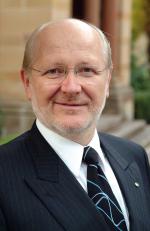From the Vice-Chancellor
I've been reflecting recently about the ways in which our University engages with the community. This engagement is an important part of what we do, and several recent events have underlined our success. Last month I travelled to Tasmania to help promote the first group of University of Adelaide-trained dentists undertaking clinical placements in the Tasmanian dental system. Under the scheme, the Federal Government allocated our Dental School extra places to be filled by students who would then be placed in Tasmania for clinical practice. Tasmania is experiencing a shortage of dentists and we were delighted to be able to help, in the same way that we are working with authorities in New South Wales. It also has the added benefit of strengthening the teaching and learning quality in our Dental School. What did strike me was the overwhelmingly positive response from Tasmanians towards our assistance. It reinforced that the University of Adelaide, while it obviously has a major impact on the South Australian community, also has a strong engagement with communities across the country. Of course, these links have also involved partnerships with the University of Tasmania and the University of Newcastle, and this has been an added benefit. This national contribution became even more apparent with the announcement of University alumnus Dr Robin Warren as a joint winner of the Nobel Prize for Medicine. Dr Warren graduated from Adelaide in 1961 with a Bachelor of Medicine and Surgery, and has been based for some time with the Royal Perth Hospital. He received the award for his work with Barry Marshall on the link between a particular type of bacteria and stomach ulcers. He becomes the fifth member of the University of Adelaide alumni community to receive a Nobel Prize - quite an accomplishment for a university of our size and in this country. Dr Warren's achievements reflect a lifetime of dedication to engaging with the community and making a more than sizeable impact upon it, and I congratulate him on his success. I also recently attended a function to recognise the formal links between the University and Australia's foremost dance institution, the Australian Ballet. We have signed a Memorandum of Understanding with the Australian Ballet, and have begun work on a major joint research project with the Ballet and the National Library of Australia. Led by Elder Conservatorium lecturer Dr Mark Carroll, this project received the largest ever research grant (almost $370,000) for Australia's Performing Arts from the Australian Research Council. It will examine the ongoing impact of the Ballets Russes tours to Australia between 1936 and 1940 which in themselves thoroughly engaged the community of the time, and the research project and associated performances by the Australian Ballet promises to further engage us over the next three to four years. These are just some of the latest demonstrations of our community engagement, and there are many others. However, while all this is happening, it is depressing to read in the OECD's Education At A Glance publication for 2005 that Australia is one of the OECD countries which is not increasing its investment in tertiary education in line with rising student numbers. Locally, the new book State of South Australia, edited by the University's John Spoehr, highlights that more needs to be done to keep young people from lower socio-economic areas in education for longer. These issues are not unrelated with one being a visible demonstration of the value we place on education and the other an outcome of that investment. The University can engage with the community, energise our economy and promote social wellbeing, but only if resources are made available. We are already taking some direct action: we have reached an in-principle agreement with the Smith Family which will see us work together to increase participation and access to education for students in Adelaide's north-western and western suburbs. It is vital that every member of our community is able to achieve their potential, and, in turn, contribute to our future. PROFESSOR JAMES A. McWHA
Vice-Chancellor
|





